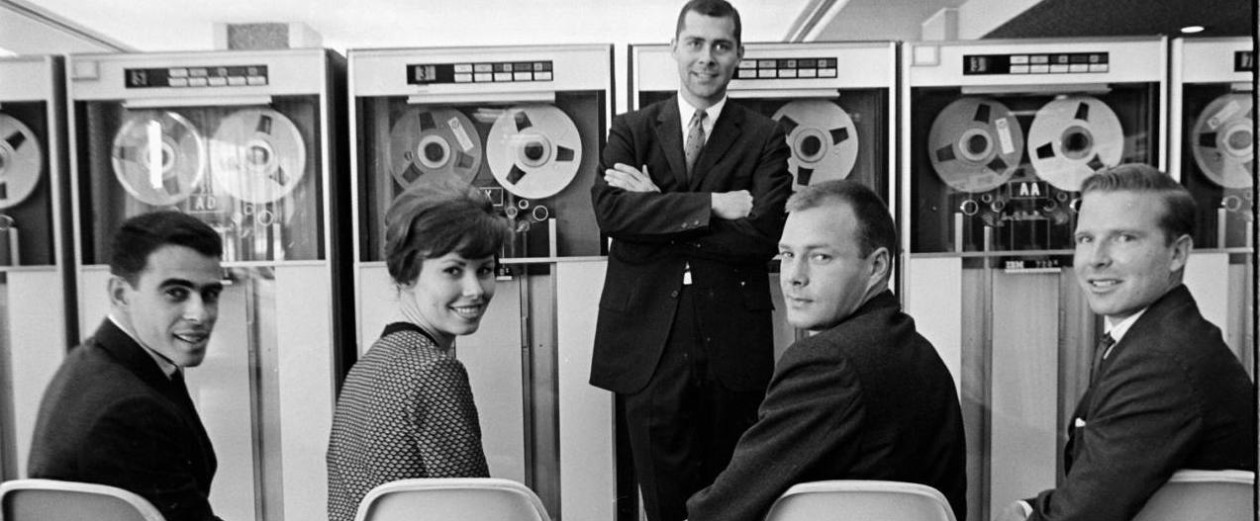In an article in today’s Washington Post, ombudsman Patrick Pexton addresses a recent Outlook essay that “borrows” heavily from my academic research. In that piece, a freelance journalist named Anna Lewis repeats my discussion of The Computer Girls article in the April 1967 issue of Cosmopolitan Magazine. This is work for which I am well known, having written about it in both The Computer Boys Take Over and in an essay published in a recent collection edited by Tom Misa called Gender Codes: Why Women are Leaving Computing (Wiley, 2010). In the original blog post that prompted the Washington Post piece, this “journalist” does link to my book site, although she does not mention me by name. She also presents her discovery of the Cosmo Girl article as entirely her own, and even copies images (again, without attribution) from this site. In the Washington Post piece, there are no links, no mention of me or my work, and only a vague allusion to the Misa collection. Lewis presents this material as being entirely her own, with no recognition of my contributions, or the work of other historians.
Whatever the Washington Post lawyers might argue, this is clearly a case of plagiarism. No question, no ambiguity. If a student had turned in a paper like this, I would have failed him or her. The guidelines on plagiarism that we provide our students at the University of Texas, for example, make this clear: “Plagiarism is another serious violation of academic integrity. In simplest terms, this occurs if you represent as your own work any material that was obtained from another source, regardless how or where you acquired it.” In this case, the plagiarism did not involve copying word-for-word my material (although the original blog post by Lewis comes pretty close), but rather the ideas. Again, the standard definition of plagiarism makes it clear that plagiarism includes not just verbatim repetition but also the “use of another person’s research, phrasing, conclusions or unique descriptions without proper attribution.”
In this case, the key theft is the sources and interpretation. The discovery of the long-lost Cosmo article, the identification of its significance to contemporary debates about gender and computing, and the situation of this material in the context of late 1960s developments in the computer industry, are mine alone, and are recognized by other professional historians as significant insights. This material was not commonly known, was not just there to be found, and would have made little sense to anyone without the analysis I provide.
This kind of intellectual theft is increasingly common in the Internet-era, but this is no excuse. If another newspaper had summarized, without attribution, an article published in the Washington Post, I doubt that they would have had such a casual attitude. In my several conversations with Patrick Pexton, he gave every impression that he regarded this as a serious breach of professional ethics on the part of Anna Lewis. The first draft of his opinion piece, which he shared with me earlier this week, took a more principled stand. The final version, however, seems to have been whitewashed by the Washington Post legal counsel.
I am generally thrilled when people benefit from my research. I hope that they learn from it and extend it in new directions. I would have been happy to write this incident off as a simple mistake, or a consequence of moving from one medium to another (in this case, from the web, which allows for hyperlinks, to print, which does not). It is only the fact that neither the author nor the Post provided any apology and no official acknowledgement of the problem that makes me upset.
In any case, as to the question of attribution, let the readers decide. Unfortunately, my essay from the Misa collection is not available online (the publisher owns the rights), although you can read a draft version from the conference presentation here. Does that first sentence look familiar? It gets repeated almost verbatim on the original Lewis blog. Do the larger ideas there and in Washington Post article seem surprisingly similar to you? Do you believe that it provided proper attribution — or indeed, any at all? The answer seems pretty obvious, no matter what the Washington Post might choose to believe.
The great irony is that, had the author and the Washington Post simply apologized to me and corrected the online version by adding a link, the matter probably would have ended there. I very deliberately kept this private, and have not sought to embarrass either the Post of the author. In choosing to deny responsibility, they made this a public matter, and demanded a response from me.
[UPDATE] The media watchdog site stinkyjournalism.com has covered the incident. This is not the first time that the Washington Post has struggled with “proper attribution.” However, they seem to have higher standards when it happens to them.

 Follow
Follow
Bravo to you for holding this woman accountable!!!
That’s really aggravating. I thought the Post was of higher quality than that–how unfortunate.
This breaks a convention used by journalists that they should cite your name (and your University affiliation) as an authority in any article using your ideas. The editor of the Washington Post should step in to maintain the integrity of one of the world’s great newspapers and publish an apology. This is weak management on their part.